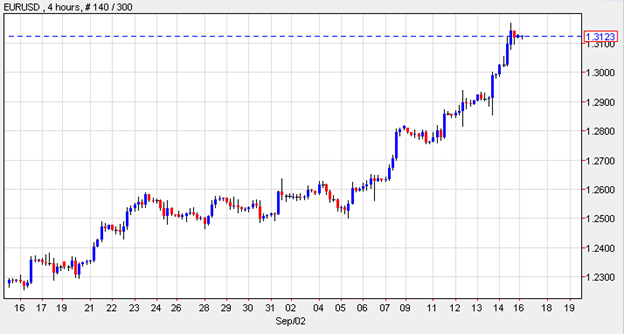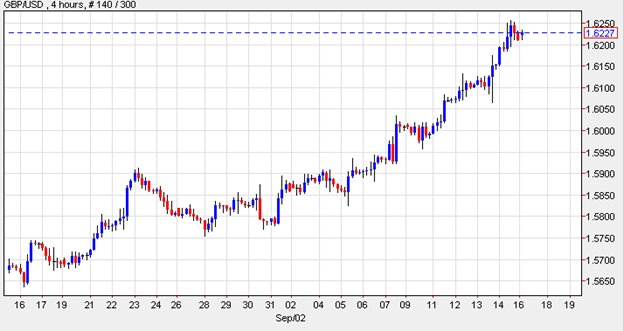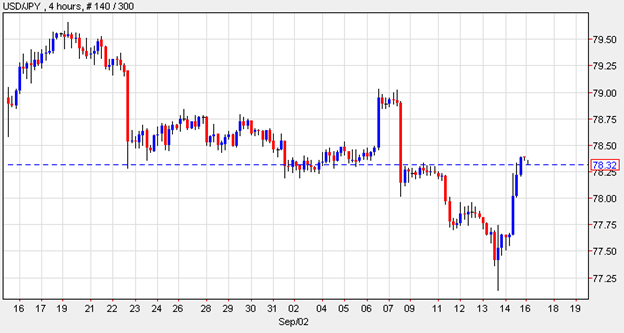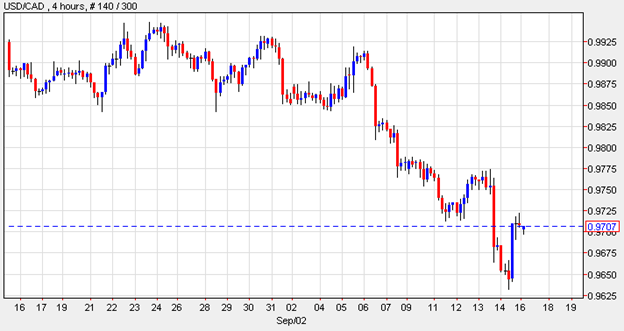The U.S. Dollar declined the most in 11 months against the Euro a day after the Federal Reserve announced it will implement another round of asset purchasing known as quantitative easing in order to bolster economic growth. The greenback had started weakening against the shared currency subsequent to the ECB announcement indicating the central bank will buy government bonds to stabilize the market and lower the borrowing costs of the most indebted nations in the Euro-zone. Also in the U.S., Friday’s reports showed that MoM, the Consumer Price Index climbed 0.6 percent in August after posting at 0% in July. Furthermore, Industrial Production contracted 1.2 percent after economists expected it to grow at least 0.2 percent. And Retail Sales went up to a seasonally adjusted 0.9 percent last month, given the increase in Consumer Confidence. Meanwhile, Canada’s Dollar traded at a 13-month high versus its American counterpart following the Fed’s statement regarding added stimulus; and the currency remained supported as crude oil, its biggest export reached above $100.00 a barrel.
The Euro spiked to a four and one half month high against the U.S. Dollar at the end of last week as risk appetite improved after the Federal Reserve explained its plans to launch another bout of quantitative easing to fuel economic growth. The Fed’s statement came after the European Central Bank revealed a program denominated the Outright Monetary Transactions plan which calls for buying government bonds. But despite the Euro’s rally, investors remained cautious on concerns Spain may soon request a bailout. In the days ahead, market participants will keep an eye on Spain’s fiscal troubles as many economists believe it’s just a matter of days before the nation’s officials request for financial assistance. The British Pound climbed to the highest price since the latter part of April against the greenback as risk appetite increased after the Federal Reserve made its intentions clear regarding another round of monetary easing.
The U.S. Dollar bounced off seven-month lows versus Japan’s currency after the nation’s Finance Minister, Jun Azumi suggested that he’s ready to intervene given the latest speculative moves which caused the Yen to rally. The Bank of Japan’s officials are scheduled to meet this week, and analysts believe they’ll use the time to announce the implementation of further monetary easing since they lowered the assessment for the economy.
Lastly, Australia’s Dollar hiked to the highest in one month versus the greenback on the likelihood the Federal Reserve’s plan to increase the purchase of assets will continue to dampen demand for the U.S. currency. The New Zealand Dollar advanced to a six-month high as stocks and commodities gained.
EUR/USD- All Eyes Are On Spain
Despite the Euro’s rally, and the optimism brought on by the ECB’s announcement indicating its plans to purchase government bonds, market participants remained worried that Spain will require a full blown bailout soon. However, Spain’s Finance Minister, Luis De Guindos said that his government still has to assess how the ECB’s support will help the country, prior to requesting further assistance. The International Monetary Fund’s Director., Christine Lagarde issued a statement denying rumors that the IMF and the ECB were holding talks to bail out Spain. On the data front, Consumer Price Inflation stayed the same at an annualized 2.6 percent. Core Consumer Price Inflation which doesn’t account for food, energy or alcohol and tobacco slipped from 1.7 to 1.5 percent. EUR/USD" title="EUR/USD" width="624" height="334">
EUR/USD" title="EUR/USD" width="624" height="334">
GBP/USD- Pound Climbs The Most Since April
The British Pound gained against the U.S. Dollar and traded at the highest price since the last part of April as demand for risk assets increased in the market. In the days to come, investors will focus on the slew of economic reports scheduled to be released out of the U.K. These include announcements on inflation and retail sales. The Sterling weakened against the Euro as optimism reigned following news that the European Central Bank will buy government bonds to stem the debt crisis. This announcement came after Germany’s Constitutional Court ruled on the validity of the European Stability Mechanism. GBP/USD" title="GBP/USD" width="624" height="331">
GBP/USD" title="GBP/USD" width="624" height="331">
USD/JPY- Azumi May Intervene
The U.S. Dollar weakened against the Yen after the Federal Reserve confirmed it plans to implement a third round of quantitative easing which will include purchasing $40 billion in mortgage-backed assets per month until the job sector improves. The Yen remained strong and spiked another 1 percent on Friday after Finance Minister, Jun Azumi suggested that intervention is a strong possibility given the over-evaluation of the Yen. On the data front, Japan lowered its assessment of the economy, increasing the likelihood the Bank of Japan will implement further monetary easing when it meets this week. This was the first downgrade since the credit crunch of 2009. USD/JPY" title="USD/JPY" width="624" height="333">
USD/JPY" title="USD/JPY" width="624" height="333">
USD/CAD- Crude Jumps Over $100 A Barrel
Canada’s Dollar rallied to more than a 13-month high versus its American counterpart as investors sought commodity-related currencies on speculation the global economies will grow. Crude oil, Canada’s biggest export climbed to more than $100.00 a barrel for the first time since May. And on the data front, domestic Factory Sales declined in July, dropping the most since August of 2011. According to official data, these plunged 1.5 percent on worries the global slowdown will affect the local economy. USD/CAD" title="USD/CAD" width="624" height="331">
USD/CAD" title="USD/CAD" width="624" height="331">
Today’s Outlook
Today’s economic calendar shows that the E.U. will report on Current Account, Trade Balance and the Labor Cost Index. Japan’s markets are closed in observance of Respect For The Aged Day. Canada will issue data on Foreign Securities Purchases. Australia will release the Monetary Policy Meeting Minutes. And The U.S. will publish the NY Empire State Manufacturing Index.
- English (UK)
- English (India)
- English (Canada)
- English (Australia)
- English (South Africa)
- English (Philippines)
- English (Nigeria)
- Deutsch
- Español (España)
- Español (México)
- Français
- Italiano
- Nederlands
- Português (Portugal)
- Polski
- Português (Brasil)
- Русский
- Türkçe
- العربية
- Ελληνικά
- Svenska
- Suomi
- עברית
- 日本語
- 한국어
- 简体中文
- 繁體中文
- Bahasa Indonesia
- Bahasa Melayu
- ไทย
- Tiếng Việt
- हिंदी
Daily Report: EUR/USD, GBP/USD, USD/JPY And USD/CAD
Published 09/17/2012, 07:02 AM
Updated 09/16/2019, 09:25 AM
Daily Report: EUR/USD, GBP/USD, USD/JPY And USD/CAD
Latest comments
Loading next article…
Install Our App
Risk Disclosure: Trading in financial instruments and/or cryptocurrencies involves high risks including the risk of losing some, or all, of your investment amount, and may not be suitable for all investors. Prices of cryptocurrencies are extremely volatile and may be affected by external factors such as financial, regulatory or political events. Trading on margin increases the financial risks.
Before deciding to trade in financial instrument or cryptocurrencies you should be fully informed of the risks and costs associated with trading the financial markets, carefully consider your investment objectives, level of experience, and risk appetite, and seek professional advice where needed.
Fusion Media would like to remind you that the data contained in this website is not necessarily real-time nor accurate. The data and prices on the website are not necessarily provided by any market or exchange, but may be provided by market makers, and so prices may not be accurate and may differ from the actual price at any given market, meaning prices are indicative and not appropriate for trading purposes. Fusion Media and any provider of the data contained in this website will not accept liability for any loss or damage as a result of your trading, or your reliance on the information contained within this website.
It is prohibited to use, store, reproduce, display, modify, transmit or distribute the data contained in this website without the explicit prior written permission of Fusion Media and/or the data provider. All intellectual property rights are reserved by the providers and/or the exchange providing the data contained in this website.
Fusion Media may be compensated by the advertisers that appear on the website, based on your interaction with the advertisements or advertisers.
Before deciding to trade in financial instrument or cryptocurrencies you should be fully informed of the risks and costs associated with trading the financial markets, carefully consider your investment objectives, level of experience, and risk appetite, and seek professional advice where needed.
Fusion Media would like to remind you that the data contained in this website is not necessarily real-time nor accurate. The data and prices on the website are not necessarily provided by any market or exchange, but may be provided by market makers, and so prices may not be accurate and may differ from the actual price at any given market, meaning prices are indicative and not appropriate for trading purposes. Fusion Media and any provider of the data contained in this website will not accept liability for any loss or damage as a result of your trading, or your reliance on the information contained within this website.
It is prohibited to use, store, reproduce, display, modify, transmit or distribute the data contained in this website without the explicit prior written permission of Fusion Media and/or the data provider. All intellectual property rights are reserved by the providers and/or the exchange providing the data contained in this website.
Fusion Media may be compensated by the advertisers that appear on the website, based on your interaction with the advertisements or advertisers.
© 2007-2025 - Fusion Media Limited. All Rights Reserved.
